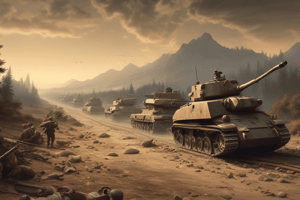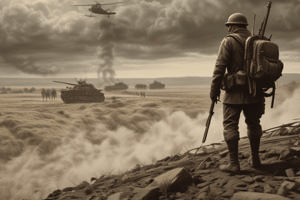Podcast
Questions and Answers
What were the main causes of World War I?
What were the main causes of World War I?
The main causes of World War I were Imperialism, Nationalism, Militarism, and the Assassination of Archduke Franz Ferdinand.
Describe the significance of the Battle of the Somme.
Describe the significance of the Battle of the Somme.
The Battle of the Somme was one of the bloodiest battles in history, resulting in over 1 million casualties.
What led to the United States' entry into World War I?
What led to the United States' entry into World War I?
The United States declared war on Germany in 1917 after Germany resumed unrestricted submarine warfare and sank American ships.
What was the significance of the Russian Revolution in the context of World War I?
What was the significance of the Russian Revolution in the context of World War I?
What were the main alliances during World War I?
What were the main alliances during World War I?
What was the significance of the Treaty of Versailles?
What was the significance of the Treaty of Versailles?
What was the total number of casualties during World War I?
What was the total number of casualties during World War I?
What was the significance of the League of Nations?
What was the significance of the League of Nations?
Flashcards are hidden until you start studying
Study Notes
Causes of World War I
- Imperialism: Competition for colonies and resources
- Nationalism: Rise of nationalist movements in Europe
- Militarism: Build-up of military forces and alliances
- Assassination of Archduke Franz Ferdinand: Spark that ignited the war
Main Events of World War I
- Outbreak of War (1914): Austria-Hungary declares war on Serbia, followed by declarations of war by other European powers
- Trench Warfare (1914-1918): Stalemate on the Western Front, characterized by trench warfare and heavy casualties
- Battle of the Somme (1916): One of the bloodiest battles in history, with over 1 million casualties
- United States Enters the War (1917): US declares war on Germany, shifting the balance of power
- Russian Revolution (1917): Russia withdraws from the war, allowing Germany to focus on the Western Front
Major Players and Alliances
- Triple Entente: France, Britain, Russia (until 1917), and United States
- Triple Alliance: Germany, Austria-Hungary, and Italy (until 1915)
- Central Powers: Germany, Austria-Hungary, and Ottoman Empire
- Allied Powers: France, Britain, Russia (until 1917), and United States
Key Figures
- Kaiser Wilhelm II: German Emperor, known for his aggressive foreign policy
- Woodrow Wilson: US President, advocated for neutrality and later led the US into the war
- Georges Clemenceau: French Prime Minister, played a key role in the Allied victory
Treaty of Versailles and Aftermath
- Treaty of Versailles (1919): Imposed harsh penalties on Germany, contributing to widespread resentment
- League of Nations: Established to promote international cooperation and prevent future wars
- War Guilt Clause: Germany forced to accept responsibility for the war, leading to widespread resentment
Casualties and Impact
- Total Deaths: Estimated 37 million casualties, including 17 million deaths
- Economic Cost: Estimated $22 billion in damages, equivalent to $330 billion in today's dollars
- Global Impact: Redrew the world map, led to the rise of the United States and the Soviet Union, and contributed to the outbreak of World War II
Causes of World War I
- Imperialism led to competition for colonies and resources, increasing tensions between European powers.
- Nationalist movements in Europe, such as the unification of Italy and Germany, led to increased rivalry and aggression.
- Militarism led to a build-up of military forces and alliances, creating a volatile situation in which a small conflict could escalate into a global war.
- The assassination of Archduke Franz Ferdinand of Austria-Hungary by Gavrilo Princip, a Serbian nationalist, sparked the war.
Main Events of World War I
- Austria-Hungary declared war on Serbia on July 28, 1914, following the assassination of Archduke Franz Ferdinand, leading to a chain reaction of declarations of war by other European powers.
- The war initially involved a series of rapid advances by German and Austro-Hungarian forces, but soon became bogged down in a stalemate on the Western Front, characterized by trench warfare and heavy casualties.
- The Battle of the Somme, fought from July 1 to November 1, 1916, was one of the bloodiest battles in history, with over 1 million casualties.
- The United States declared war on Germany on April 6, 1917, following Germany's resumption of unrestricted submarine warfare and the revelation of the Zimmermann Telegram, which attempted to persuade Mexico to declare war on the US.
- The Russian Revolution, which began in March 1917, led to Russia's withdrawal from the war, allowing Germany to focus its resources on the Western Front.
Major Players and Alliances
- The Triple Entente, consisting of France, Britain, Russia (until 1917), and the United States, was formed to counter the growing power of Germany.
- The Triple Alliance, consisting of Germany, Austria-Hungary, and Italy (until 1915), was formed to promote mutual defense and cooperation.
- The Central Powers, consisting of Germany, Austria-Hungary, and the Ottoman Empire, fought against the Allied Powers, consisting of France, Britain, Russia (until 1917), and the United States.
- Italy initially remained neutral, but eventually joined the Allied Powers in 1915.
Key Figures
- Kaiser Wilhelm II, the German Emperor, was known for his aggressive foreign policy and his role in escalating the war.
- Woodrow Wilson, the US President, initially advocated for neutrality, but eventually led the US into the war, motivated by a desire to make the world "safe for democracy".
- Georges Clemenceau, the French Prime Minister, played a key role in the Allied victory and was a strong advocate for the harsh treatment of Germany.
Treaty of Versailles and Aftermath
- The Treaty of Versailles, imposed on Germany in 1919, imposed harsh penalties, including massive reparations, which contributed to widespread resentment and economic instability.
- The League of Nations, established by the Treaty of Versailles, was intended to promote international cooperation and prevent future wars, but it ultimately failed to prevent the outbreak of World War II.
- The War Guilt Clause, which forced Germany to accept responsibility for the war, led to widespread resentment and contributed to the rise of Nazi Germany.
Casualties and Impact
- The war resulted in an estimated 37 million casualties, including 17 million deaths.
- The economic cost of the war was estimated at $22 billion in damages, equivalent to $330 billion in today's dollars.
- The war had a profound impact on the global order, leading to the redrawing of the world map, the rise of the United States and the Soviet Union as superpowers, and contributing to the outbreak of World War II.
Studying That Suits You
Use AI to generate personalized quizzes and flashcards to suit your learning preferences.




